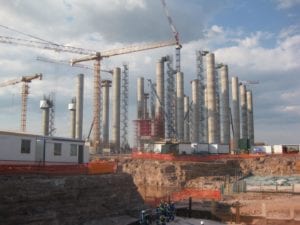Economic regulators should cut back cost overruns of large infrastructure projects by limiting user tariffs used to repay them.
National Energy Regulator of South Africa’s (Nersa) Patrick Mabuza told this to a recent conference hosted by Nersa and the University of Johannesburg. He cited e-tolling in Gauteng and Eskom’s construction of the Medupi power station as examples of large infrastructure projects with cost overruns. The theme of the conference was “Economic Regulation in Africa: How can economic regulators best facilitate infrastructure expansion?” Energy Minister Ben Martins said the theme of the conference resonates with the South African government’s programme of expanding infrastructure to stimulate industrialisation and job creation. Mabuza said regulators have the dual responsibility of ensuring that consumers are not overcharged, while also ensuring that utilities receive reasonable income. Regulators should also encourage efficient procurement of infrastructure and discourage cartels. The National Development Plan (NDP) says that regulators have a duty to ensure adequate levels of investment to ensure users get reliable services, Business Day reported. Speaking at the conference, Martins said that in order for regulators like Nersa to influence and facilitate greater investments in infrastructure, they should have adequate powers to make and enforce compliance with laws and regulations. The NDP states that although regulators have succeeded in issuing licences, developing pricing methods and establishing technical and service standards, they have not achieved the positive outcomes initially envisaged. The NDP therefore sets out critical interventions that need to be implemented to improve the performance and effectiveness of economic regulators.Martins saysthe Department of Energy will continue to work with economic regulators in the energy sector to identify measures to strengthen their capacity and improve performance.Cost overruns in large infrastructure projects occur frequently in South Africa, Business Day reported. The Competition Commission recently identified 300 collusion cases in projects worth R47 billion in the construction sector between 2000 and 2010.Mabuza said regulators could prevent users from paying for possible overcharging which may result from anticompetitive activity in the construction sector.
Nersa has already limited electricity tariff increases proposed by Eskom, which has resulted in the utility scaling back its infrastructure investment plans. Energy infrastructure backlog According to Martins, Africa needs $43 billion per annum to address the energy backlog by 2040. If the financing gap is not filled by 2020, 35% of the continent’s energy demand will not be met. “The lack of enabling infrastructure and services means that many people do not participate in the economy and cannot receive adequate social services such as health and security, as these social services are enabled by transport, energy and communications infrastructure, among others,” he said.






